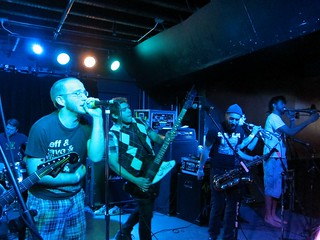Finally: dense lyrics, wicked flow, and great musicality
 Fans of the original Deltron 3030 album could be forgiven for thinking that they’d have to wait another 1030 years to get the sequel. The tight team of Del the Funky Homosapien, Dan “the Automator” Nakamura and Kid Koala created a near masterpiece back in 2000, weaving an Afrocentric sci-fi tale of a hip hop techno-revolutionary rising up to challenge the corporate New World Order. After achieving critical success, it didn’t take long for rumors to surface that a follow-on project was in the works. By 2006, Del confirmed that they were making quick progress. Nakamura even projected a 2007 release. But after repeated delays, it seemed like “Time Keeps On Slipping”, their single from the original album, had the straight dope, “No one knows the time, pass me by.” Even after the group performed new material at the Luminato festival in June 2012 and released teaser tracks earlier in 2013, it was hard to believe that they’d really deliver the sequel. But defying past experience, they’ve finally released Event 2.
Fans of the original Deltron 3030 album could be forgiven for thinking that they’d have to wait another 1030 years to get the sequel. The tight team of Del the Funky Homosapien, Dan “the Automator” Nakamura and Kid Koala created a near masterpiece back in 2000, weaving an Afrocentric sci-fi tale of a hip hop techno-revolutionary rising up to challenge the corporate New World Order. After achieving critical success, it didn’t take long for rumors to surface that a follow-on project was in the works. By 2006, Del confirmed that they were making quick progress. Nakamura even projected a 2007 release. But after repeated delays, it seemed like “Time Keeps On Slipping”, their single from the original album, had the straight dope, “No one knows the time, pass me by.” Even after the group performed new material at the Luminato festival in June 2012 and released teaser tracks earlier in 2013, it was hard to believe that they’d really deliver the sequel. But defying past experience, they’ve finally released Event 2.
With all the hype and hoopla, it’s inevitable that many fans will find fault with the album’s darker mood and comedic missteps. Not quite a direct descendant of the original Deltron 3030, the storyline reflects themes from the intervening decade of real life: one percenters wallow in greed while banks fail and the government uses external threats to dominate the people. The first episode had its own cynical view of society’s gatekeepers, especially in the guise of the music industry, but Event 2 has internalized much of the pessimism that’s come in the wake of 9/11 and economic collapse. Our hero, Deltron Zero makes the journey from first responder in “The Return” to deification as Osiris, god of life and death, on “City Rising From The Ashes”. The negativity doesn’t hurt the narrative because it provides Deltron Zero something to fight against. The larger problem is with the balance of tension and release. The skits are designed to offset the heaviness of the story. With Del’s incredibly dense lyrical flow, that becomes even more important. Unfortunately, the album’s lighter moment fall flat. For example, where MC Paul Barman’s segment on the first album, “Meet Cleofis Randolph The Patriarch”, captured his voice and humor, the “Lawnchair Quarterback” tracks with David Cross and Amber Tamblyn or chef David Chang’s “The Future of Food” all drag on as stilted improvisation. The Lonely Planet’s “Back in the Day” could pass as a Firesign Theater castoff as they shuck their way through a goofy old fart riff, where the best moment is a weak meta-level joke, “Back in the day before time travel was easy-peasy, but now we go back, re-rap to make it sound repeaty/ Back in the day before time travel was easy-peasy/ Back in the day before time travel was easy-peasy…”
Honestly, though, rap album skits are always a bit lame. Even if there’s not enough sweet for the bitter, the real test lies in how well the crew delivers on the main tracks. Fortunately, Event II has plenty to offer in this regard. After the preamble of “Stardate”, they dive right into the story with “The Return”. The heavy beat and record-scratch accents pair up with an open, post-rock progression as Del outlines the dystopian background: privateers fighting an authoritarian government as society falls apart. After the hook announces the return of Deltron Zero and Automator, the song breaks into a freefall descent. The next verse features Deltron Zero and his posse making their first impact, rescuing a woman from drugged-out muggers. This song features all three members of the collective in top form. Del’s lyrics are denser than ever before, packed tight with plot points and detail. His conversational flow is rhythmic but sometimes the slant rhymes almost slip past because of his idiosyncratic phrasing. Kid Koala’s turntable riffs skitter along the edges, especially in the choppy breaks. I’ll give Nakamura the credit for the musical vision of the piece, which offers at least three distinct sections. Del’s voice may drive this tune and the rest of the album, but Nakamura’s musicality gives the project its concept album depth.
By “The Agony”, Deltron Zero has set his sights a bit higher and is moving against the empire with a ship and a mercenary crew. Backed by moody funk, the tight-fitting lyrics just roll out, “Superior technology wielded by the oddity/ The loose cannon, the lyrical mage and prodigy/ Deltron probably.” The bass and horn skeleton of the groove is balanced by occasional swooping string fills.
My favorite song is “What Is This Loneliness”. It’s a slight interlude in the flow of the story, with Del and guest rapper Casual swapping verses about interstellar aliens. Casual’s gruffer tone is a welcome contrast and he lays down some solid lines, “Damn, who would volunteer/ To bounce extremely low frequency rhymes off the ionosphere/ Tell all alien life, ‘I’m in here’/ So, your vessel? It could get commandeered.” The chorus offers a soft pop reprieve from the heavy verses. Damon Albarn sings it with an accent that suggests David Bowie’s “Space Oddity”, which fits the space opera feel of the piece.
It’s tempting to judge Event 2 against Deltron 3030, or rather the idealized memory of the predecessor, and find it lacking. But listening to both side by side, each has its own voice and strengths. It’s been a long wait for the follow-up, but it’s worth it to hear the growth of all of the contributors.
(This review first appeared on Spectrum Culture)
 Fans of the original Deltron 3030 album could be forgiven for thinking that they’d have to wait another 1030 years to get the sequel. The tight team of Del the Funky Homosapien, Dan “the Automator” Nakamura and Kid Koala created a near masterpiece back in 2000, weaving an Afrocentric sci-fi tale of a hip hop techno-revolutionary rising up to challenge the corporate New World Order. After achieving critical success, it didn’t take long for rumors to surface that a follow-on project was in the works. By 2006, Del confirmed that they were making quick progress. Nakamura even projected a 2007 release. But after repeated delays, it seemed like “Time Keeps On Slipping”, their single from the original album, had the straight dope, “No one knows the time, pass me by.” Even after the group performed new material at the Luminato festival in June 2012 and released teaser tracks earlier in 2013, it was hard to believe that they’d really deliver the sequel. But defying past experience, they’ve finally released Event 2.
Fans of the original Deltron 3030 album could be forgiven for thinking that they’d have to wait another 1030 years to get the sequel. The tight team of Del the Funky Homosapien, Dan “the Automator” Nakamura and Kid Koala created a near masterpiece back in 2000, weaving an Afrocentric sci-fi tale of a hip hop techno-revolutionary rising up to challenge the corporate New World Order. After achieving critical success, it didn’t take long for rumors to surface that a follow-on project was in the works. By 2006, Del confirmed that they were making quick progress. Nakamura even projected a 2007 release. But after repeated delays, it seemed like “Time Keeps On Slipping”, their single from the original album, had the straight dope, “No one knows the time, pass me by.” Even after the group performed new material at the Luminato festival in June 2012 and released teaser tracks earlier in 2013, it was hard to believe that they’d really deliver the sequel. But defying past experience, they’ve finally released Event 2.With all the hype and hoopla, it’s inevitable that many fans will find fault with the album’s darker mood and comedic missteps. Not quite a direct descendant of the original Deltron 3030, the storyline reflects themes from the intervening decade of real life: one percenters wallow in greed while banks fail and the government uses external threats to dominate the people. The first episode had its own cynical view of society’s gatekeepers, especially in the guise of the music industry, but Event 2 has internalized much of the pessimism that’s come in the wake of 9/11 and economic collapse. Our hero, Deltron Zero makes the journey from first responder in “The Return” to deification as Osiris, god of life and death, on “City Rising From The Ashes”. The negativity doesn’t hurt the narrative because it provides Deltron Zero something to fight against. The larger problem is with the balance of tension and release. The skits are designed to offset the heaviness of the story. With Del’s incredibly dense lyrical flow, that becomes even more important. Unfortunately, the album’s lighter moment fall flat. For example, where MC Paul Barman’s segment on the first album, “Meet Cleofis Randolph The Patriarch”, captured his voice and humor, the “Lawnchair Quarterback” tracks with David Cross and Amber Tamblyn or chef David Chang’s “The Future of Food” all drag on as stilted improvisation. The Lonely Planet’s “Back in the Day” could pass as a Firesign Theater castoff as they shuck their way through a goofy old fart riff, where the best moment is a weak meta-level joke, “Back in the day before time travel was easy-peasy, but now we go back, re-rap to make it sound repeaty/ Back in the day before time travel was easy-peasy/ Back in the day before time travel was easy-peasy…”
Honestly, though, rap album skits are always a bit lame. Even if there’s not enough sweet for the bitter, the real test lies in how well the crew delivers on the main tracks. Fortunately, Event II has plenty to offer in this regard. After the preamble of “Stardate”, they dive right into the story with “The Return”. The heavy beat and record-scratch accents pair up with an open, post-rock progression as Del outlines the dystopian background: privateers fighting an authoritarian government as society falls apart. After the hook announces the return of Deltron Zero and Automator, the song breaks into a freefall descent. The next verse features Deltron Zero and his posse making their first impact, rescuing a woman from drugged-out muggers. This song features all three members of the collective in top form. Del’s lyrics are denser than ever before, packed tight with plot points and detail. His conversational flow is rhythmic but sometimes the slant rhymes almost slip past because of his idiosyncratic phrasing. Kid Koala’s turntable riffs skitter along the edges, especially in the choppy breaks. I’ll give Nakamura the credit for the musical vision of the piece, which offers at least three distinct sections. Del’s voice may drive this tune and the rest of the album, but Nakamura’s musicality gives the project its concept album depth.
By “The Agony”, Deltron Zero has set his sights a bit higher and is moving against the empire with a ship and a mercenary crew. Backed by moody funk, the tight-fitting lyrics just roll out, “Superior technology wielded by the oddity/ The loose cannon, the lyrical mage and prodigy/ Deltron probably.” The bass and horn skeleton of the groove is balanced by occasional swooping string fills.
My favorite song is “What Is This Loneliness”. It’s a slight interlude in the flow of the story, with Del and guest rapper Casual swapping verses about interstellar aliens. Casual’s gruffer tone is a welcome contrast and he lays down some solid lines, “Damn, who would volunteer/ To bounce extremely low frequency rhymes off the ionosphere/ Tell all alien life, ‘I’m in here’/ So, your vessel? It could get commandeered.” The chorus offers a soft pop reprieve from the heavy verses. Damon Albarn sings it with an accent that suggests David Bowie’s “Space Oddity”, which fits the space opera feel of the piece.
It’s tempting to judge Event 2 against Deltron 3030, or rather the idealized memory of the predecessor, and find it lacking. But listening to both side by side, each has its own voice and strengths. It’s been a long wait for the follow-up, but it’s worth it to hear the growth of all of the contributors.
(This review first appeared on Spectrum Culture)

 Let the ritual of fuzz begin! Heat shimmers, metallic grind, throaty roars, and muted growls - a multitude of textures awaits on
Let the ritual of fuzz begin! Heat shimmers, metallic grind, throaty roars, and muted growls - a multitude of textures awaits on  There is a moment of clarity when will and intent drop away, a moment that exists outside of time. Buddhists call it satori. On The Politics of Lonely, Julien Demoulin and
There is a moment of clarity when will and intent drop away, a moment that exists outside of time. Buddhists call it satori. On The Politics of Lonely, Julien Demoulin and 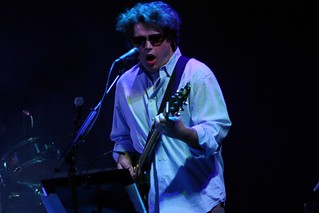
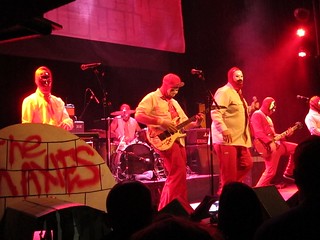
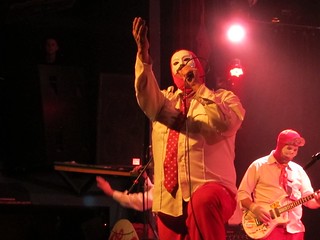
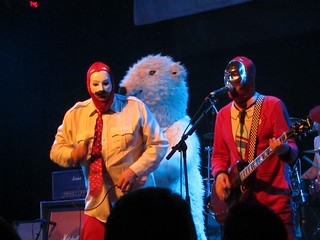

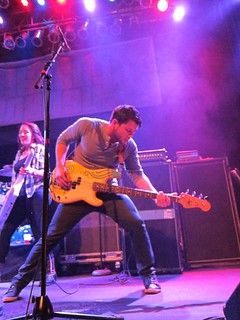

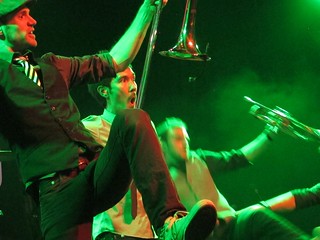
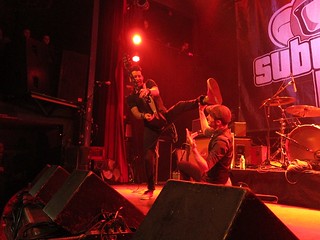


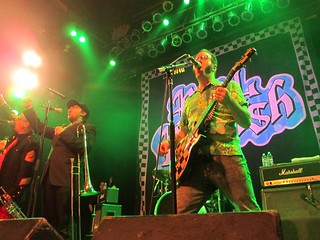
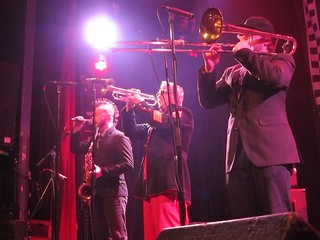
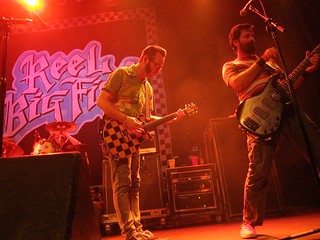
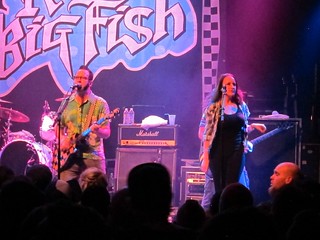
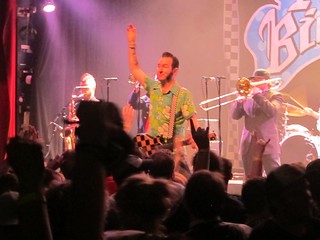
 Can you get too much of a bad thing? A bass beat rumble and detuned guitar strums set the foreboding mood at the very start of Through a Pre-Memory. Joined by an artificial snare and strangely reverberating voices, the ironically named “Muse” is like a gateway into schizophrenic darkness. The dissonant chord progression climbs a couple of steps in an irregular repetition, but, like Sisyphus, always slips back to its starting point. Within the first two minutes, the bleak, defeatist feeling is almost overwhelming and it’s daunting to realize that the track still has another 19 minutes to run. The sonic palette extends to include additional ghostly intrusions: short, insectile squiggles of electronic static like a bad patch cable and jarring echoes of noise that might have their roots in an abused guitar. At 5:22, Alan Dubin from the doom metal band, Khanate, makes his first appearance. Hosting us on our haunted house tour, he roughly shouts a few lines from the writings of Russian poet Anna Akhmatova. The experimental experience transitions into a new ethereal realm, dominated by squeals, squonks and otherworldly echoes. Eventually, at 12:23, Dubin returns to assault us with a rawly screamed accusation that begins, “When/ At night/ I wait for her.” His feral ranting is matched by a metal guitar grind. At this point, it’s so disturbing that it’s easy to look back fondly on the welcoming embrace of the song’s beginning.
Can you get too much of a bad thing? A bass beat rumble and detuned guitar strums set the foreboding mood at the very start of Through a Pre-Memory. Joined by an artificial snare and strangely reverberating voices, the ironically named “Muse” is like a gateway into schizophrenic darkness. The dissonant chord progression climbs a couple of steps in an irregular repetition, but, like Sisyphus, always slips back to its starting point. Within the first two minutes, the bleak, defeatist feeling is almost overwhelming and it’s daunting to realize that the track still has another 19 minutes to run. The sonic palette extends to include additional ghostly intrusions: short, insectile squiggles of electronic static like a bad patch cable and jarring echoes of noise that might have their roots in an abused guitar. At 5:22, Alan Dubin from the doom metal band, Khanate, makes his first appearance. Hosting us on our haunted house tour, he roughly shouts a few lines from the writings of Russian poet Anna Akhmatova. The experimental experience transitions into a new ethereal realm, dominated by squeals, squonks and otherworldly echoes. Eventually, at 12:23, Dubin returns to assault us with a rawly screamed accusation that begins, “When/ At night/ I wait for her.” His feral ranting is matched by a metal guitar grind. At this point, it’s so disturbing that it’s easy to look back fondly on the welcoming embrace of the song’s beginning. One look at the title reveals the standard marketing technique: bait the hook with a rhetorical query and hope that people will be intrigued enough to buy the album. But it turns out that it’s a legitimate question without a clear answer. Who Is
One look at the title reveals the standard marketing technique: bait the hook with a rhetorical query and hope that people will be intrigued enough to buy the album. But it turns out that it’s a legitimate question without a clear answer. Who Is 

